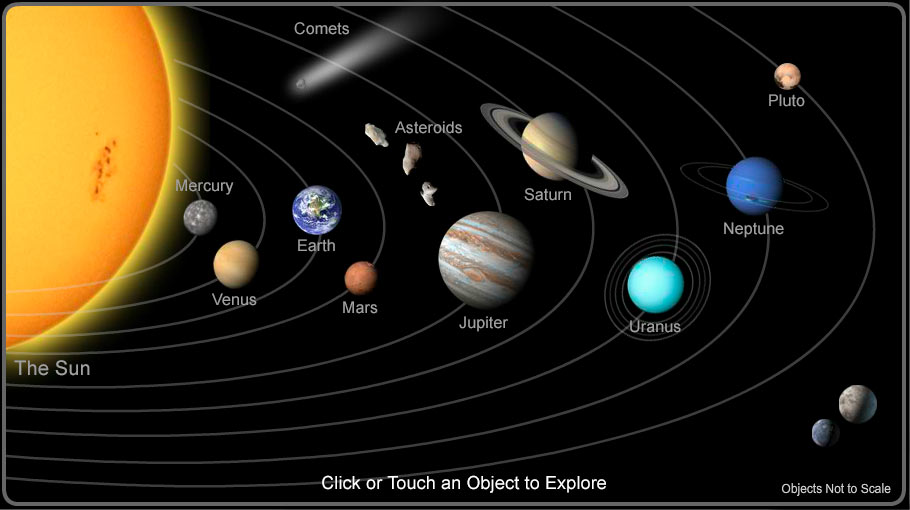SOLAR SYSTEM
![]()

California Content Standards
FIFTH GRADE 5. The solar system consists of planets and other bodies that orbit the Sun in predictable paths. As a basis for understanding this concept:
- a. Students know the Sun, an average star, is the central and largest body in the solar system and is composed primarily of hydrogen and helium.
- b. Students know the solar system includes the planet Earth, the Moon, the Sun, eight other planets and their satellites, and smaller objects, such as asteroids and comets.
- c. Students know the path of a planet around the Sun is due to the gravitational attraction between the Sun and the planet.
Eighth Grade 4. The structure and composition of the universe can be learned from studying stars and galaxies and their evolution. As a basis for understanding this concept:
- a. Students know galaxies are clusters of billions of stars and may have different shapes.
- b. Students know that the Sun is one of many stars in the Milky Way galaxy and that stars may differ in size, temperature, and color.
- c. Students know how to use astronomical units and light years as measures of distances between the Sun, stars, and Earth.
- d. Students know that stars are the source of light for all bright objects in outer space and that the Moon and planets shine by reflected sunlight, not by their own light.
- e. Students know the appearance, general composition, relative position and size, and motion of objects in the solar system, including planets, planetary satellites, comets, and asteroids.
PowerPoints
Internet Resources
Interactive 3D Solar System Starry Skies
Eyes on the Solar System Exploring Comets Planet Quest
Exteme Planet Makeover Nine Planets.org Planet Pictures
Thinkquest Planetary Tour NASA Kid's Club Universe Sandbox
Amazing Space Explorations Spacewalk Interactive
International Space Station Interactive ISS from NASA
Gravitational Pull Interactive Your Weight on Other Planets
Your Age on Other Planets Solar System Model StarChild
Imagine the Universe NASA's 50th Anniversary Museum
Teacher Resources
Use "Sky" in Google Earth Worldwide Telescope -Download from Microsoft
Universe Sandbox- download
Space.com NASA for Educators Amazing Space for Educators
NASA Video Gallery Documentary Journey to the Moon
50th Anniversary of 1st Manned Space Flight
1. Enter your name and initial of last name. Ex. Lori C
2. Enter Mrs. Berg's email address - joberg@kern.org
3. Choose the title of the story we are working on. "Childhood Stories of George Washington"
4. You will see a spelling test. Go to the bottom and click CHECK MY SPELLING AND SHOW ME GAMES.
Lunar Eclipse from 12/21/2010
